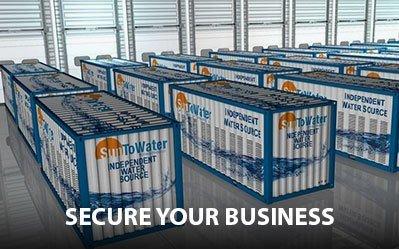
The ability to harvest water from air is a technology that has existed for a long time, even going as far back as the Incas. But success in scaling up this technology has been elusive. The largest hurdle is that the technology is energy-intensive, making it cost-prohibitive with dubious results.
The end game has been plenty of startup companies that promised to revolutionize the delivery of drinking water, but ended up fading from view. Similar technologies, such as the harvesting of water from fog, were touted as a way to help communities cope with water stress, but again their scalability has proven to be a massive challenge.
Yet another startup, Palo Alto-based SunToWater, claims it has a residential and commercial drinking water solution that will not cause utility bills to skyrocket.
The system resembles a standard outdoor air-conditioning unit. Fans blow air over desiccant salts inside the module. Heat from solar thermal collectors bakes water out of those salts, which in turn creates steam that accumulates within a condenser and is then ready to use. The result, says the company, is a steady stream of water that can create a minimum of 40 gallons daily. Customers can purchase more than one unit and stack them, which would allow customers to collect enough water to maintain swimming pool levels, care for surrounding landscaping or, most importantly, offer a generously reliable source of drinking water.
Hence, a reliable drinking water system is available that could be used anywhere. SunToWater insists the system can work in any environment, even in a city suffering from high levels of air pollution, as those desiccant salts only collect water molecules, not airborne contaminants. Since it does not rely on freon, the company says the use of those salts also makes it feasible for the system to work in the harshest desert climate. And because the system was designed to operate “off-the-grid,” it can generate water while using 70 percent less power than other air-to-water machines.
The systems can now be "reserved" for $500 each. And as for the final cost once these are available for market? They will set you back $9,000 each, although the more you buy, the more you save (unless you only purchase two or three). Unfortunately, the company is making it difficult by not making the case of how these units will save consumers money – no lifecycle analysis and no comparisons to the costs of using municipal or bottled water. And most glaringly, there is no estimated time of arrival for the systems.
So, is this a viable solution for providing drinking water or an investment in a pipe dream? Harvesting water from air certainly offers a “wow” factor, but it is concerning that this technology has been around for years without much investor enthusiasm. Scientists, policy makers and researchers have focused on solutions like desalination or aquifer recharging instead. Time will tell if this solution will be cost effective, and I'd be reluctant to spring for the reservation without seeing more hard numbers.
Image credit: SunToWater

Leon Kaye has written for 3p since 2010 and become executive editor in 2018. His previous work includes writing for the Guardian as well as other online and print publications. In addition, he's worked in sales executive roles within technology and financial research companies, as well as for a public relations firm, for which he consulted with one of the globe’s leading sustainability initiatives. Currently living in Central California, he’s traveled to 70-plus countries and has lived and worked in South Korea, the United Arab Emirates and Uruguay.
Leon’s an alum of Fresno State, the University of Maryland, Baltimore County and the University of Southern California's Marshall Business School. He enjoys traveling abroad as well as exploring California’s Central Coast and the Sierra Nevadas.














